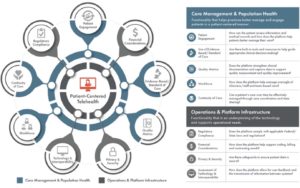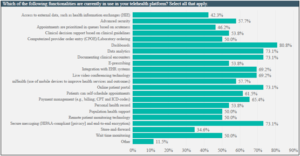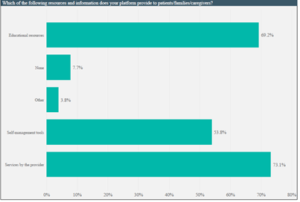Telehealth Questionnaire: We Have the Results
October 19, 2020 · NCQA Communications
To inform future telehealth product assessments and care frameworks, NCQA released a questionnaire in May 2020 to learn more about telehealth platform features and the delivery of quality virtual care. NCQA identified key areas of telehealth that could support the delivery of safe, effective, timely, equitable and efficient care to inquire around and to understand functionalities supported by telehealth platforms. The two-part model framework focused on foundational and value-add functions for high quality telehealth:

Participants were from 26 organizations that own or have developed a telehealth platform.
- 50% of respondents were from newer startups in operation for ≤20 years. 20% have ≤50 employees and about 20% have >1,000 employees.
- 24 are privately held; all but 1 are for-profit.
- 50% of respondents were company executives or working in IT or product development.
 Findings:
Findings:
For their customers, most platforms serve a multi-specialty market with a majority including primary care and behavioral health specialties.
Interestingly, pretty much all respondents have performance measure capabilities, but they vary by platform. It was reassuring to see that most said that their quality measurement capabilities are based on nationally recognized standards (e.g., CMS eCQMs, NCQA HEDIS®).
As for technology, some respondent capabilities have been widely adopted by telehealth platforms and some might be closer to the technological frontier. Over 70% identified offering common functionalities. Asynchronous and mHealth features were less widely adopted such as population health capabilities and store-and-forward capabilities. However possibly pointing to the technological frontier, a few integrated biometric data from patient wearables and use artificial intelligence or bots to help with patient screening.
 Possibly supported by many of the platforms capable of integrating with EHR systems, the collection of patient information is evident, which includes collecting patient communication needs, problem lists as well as patient and family medical history. Since many of the platform customers are representative of primary care and behavioral health, most provide secure screenings (e.g PHQ 9) within their platform.
Possibly supported by many of the platforms capable of integrating with EHR systems, the collection of patient information is evident, which includes collecting patient communication needs, problem lists as well as patient and family medical history. Since many of the platform customers are representative of primary care and behavioral health, most provide secure screenings (e.g PHQ 9) within their platform.
Offering technical and training supports for patients, families, and providers is pretty standard across platforms. Interestingly and important, a majority identified having a process for assessing technical barriers such as broadband access.
Specific Data:
Technology: Some respondent capabilities have been widely adopted by telehealth platforms and some might be closer to the technological frontier.
- 88% offer secure communication outside of appointments and provide systems for secure communications within care teams.
- >80% include dashboards that provide administrative support.
- Almost 75% include systems for documenting clinical encounters and an online patient portal.
- Some components are less widely adopted, including population health capabilities (50%) and store-and-forward capabilities (35%).
- 46% can integrate biometric data from patient wearables.
- 27% use artificial intelligence or bots to help with patient screening (pointing to a potential technical frontier).
Patient Information Collection
- 85% of respondents can document patient communication needs.
- 85% of respondents can record a patient problem list; 77% could record patient and family medical history.
- 77% of respondents offer the ability to provide secure screenings (e.g., PHQ-9).
Support for Patients and Providers
- 73% of respondents offer technical support to patients and their families.
- 77% of respondents have a process in place for assessing technical barriers such as broadband access.
- 72% of respondents offer accommodations for patients with disabilities. Respondents report a mix of other patient supports: educational resources (69%); lists of provider services (73%); self-management tools (54%).
- 85% of respondents provide user training for clinicians and support staff.
Performance Measurement
All respondents have performance measure capabilities, but they vary by platform.
- 58% track appointment availability, care coordination and effectiveness of technology.
- 62% track clinical quality; 65% track patient experience; 62% track utilization.
- 73% said that their quality measurement capabilities are based on nationally recognized standards (e.g., CMS eCQMs, NCQA HEDIS®).








